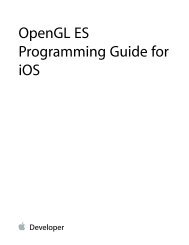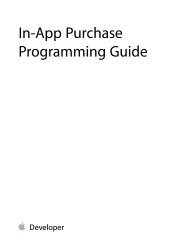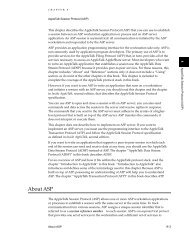URL Loading System Programming Guide - Apple Developer
URL Loading System Programming Guide - Apple Developer
URL Loading System Programming Guide - Apple Developer
You also want an ePaper? Increase the reach of your titles
YUMPU automatically turns print PDFs into web optimized ePapers that Google loves.
Using NS<strong>URL</strong>Session<br />
The NS<strong>URL</strong>Session class and related classes provide an API for downloading content via HTTP. This API<br />
provides a rich set of delegate methods for supporting authentication and gives your app the ability to perform<br />
background downloads when your app is not running or, in iOS, while your app is suspended.<br />
To use the NS<strong>URL</strong>Session API, your app creates a series of sessions, each of which coordinates a group of<br />
related data transfer tasks. For example, if you are writing a web browser, your app might create one session<br />
per tab or window. Within each session, your app adds a series of tasks, each of which represents a request<br />
for a specific <strong>URL</strong> (and for any follow-on <strong>URL</strong>s if the original <strong>URL</strong> returned an HTTP redirect).<br />
Like most networking APIs, the NS<strong>URL</strong>Session API is highly asynchronous. If you use the default,<br />
system-provided delegate, you must provide a completion handler block that returns data to your app when<br />
a transfer finishes successfully or with an error. Alternatively, if you provide your own custom delegate objects,<br />
the task objects call those delegates’ methods with data as it is received from the server (or, for file downloads,<br />
when the transfer is complete).<br />
Note: Completion callbacks are primarily intended as an alternative to using a custom delegate. If<br />
you create a task using a method that takes a completion callback, the delegate methods for response<br />
and data delivery are not called.<br />
The NS<strong>URL</strong>Session API provides status and progress properties, in addition to delivering this information to<br />
delegates. It supports canceling, restarting (resuming), and suspending tasks, and it provides the ability to<br />
resume suspended, canceled, or failed downloads where they left off.<br />
Understanding <strong>URL</strong> Session Concepts<br />
The behavior of the tasks in a session depends on three things: the type of session (determined by the type<br />
of configuration object used to create it), the type of task, and whether the app was in the foreground when<br />
the task was created.<br />
Types of Sessions<br />
The NS<strong>URL</strong>Session API supports three types of sessions, as determined by the type of configuration object<br />
used to create the session:<br />
2013-10-22 | Copyright © 2003, 2013 <strong>Apple</strong> Inc. All Rights Reserved.<br />
15
















